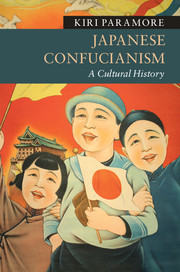Book contents
- Frontmatter
- Epigraph
- Contents
- List of figures
- List of maps
- Acknowledgments
- Notes on the text
- Timeline
- Maps
- Introduction
- 1 Confucianism as cultural capital (mid-first millennium CE–late sixteenth century CE)
- 2 Confucianism as religion (1580s–1720s)
- 3 Confucianism as public sphere (1720s–1868)
- 4 Confucianism as knowledge (1400s–1800s)
- 5 Confucianism as liberalism (1850s–1890s)
- 6 Confucianism as fascism (1868–1945)
- 7 Confucianism as taboo (1945–2015)
- Epilogue: China and Japan: East Asian modernities and Confucian revivals compared
- Notes
- Works Cited
- Index
4 - Confucianism as knowledge (1400s–1800s)
Published online by Cambridge University Press: 05 April 2016
- Frontmatter
- Epigraph
- Contents
- List of figures
- List of maps
- Acknowledgments
- Notes on the text
- Timeline
- Maps
- Introduction
- 1 Confucianism as cultural capital (mid-first millennium CE–late sixteenth century CE)
- 2 Confucianism as religion (1580s–1720s)
- 3 Confucianism as public sphere (1720s–1868)
- 4 Confucianism as knowledge (1400s–1800s)
- 5 Confucianism as liberalism (1850s–1890s)
- 6 Confucianism as fascism (1868–1945)
- 7 Confucianism as taboo (1945–2015)
- Epilogue: China and Japan: East Asian modernities and Confucian revivals compared
- Notes
- Works Cited
- Index
Summary
Confucianism is the Way of Benevolence, Medicine is the Technique of Benevolence.
Kagawa Shūan, Confucian and Medical Scholar (Ippondō Yakusen [Pharmaceutical Selection of the Ippon School], 1731 (manuscript in University of Tokyo Library))Confucianism critically affected not only the religious, cultural, and political life of early modern Japan but also the fields of science, medicine, and technology. Confucianism in Tokugawa Japan was involved in the importation and development of “useful knowledge” in the form of agricultural and industrial technique from China, and medicine, industrial technology, and military intelligence from China, Korea, Manchuria, Holland, and beyond. In the later Tokugawa period, Confucianism was instrumental in facilitating engagement with a wide array of Western science and technology. Confucianism was also vital for importing and developing a form of useful knowledge often not emphasized in history of science scholarship, yet vital for economic development in the non-Western modern: knowledge of Western statecraft and systems of governance – the sociological technologies of Western imperialism.
“Useful knowledge” is a term in the fields of economic history and the history of science used to identify knowledge which has practical application. It has been defined as, “technology in its widest sense is [as] the manipulation of nature for human material gain” (Mokyr 2002: 3–4, 284). Since the 1970s, studies on the sociology of knowledge and the interdisciplinary study of STS (Science, Technology, Society) have emphasized the key role of socio-political factors in determining whether a society is supportive or obstructive of technological innovation and its application. By contrast, writing on early modern Japan seldom engages the complex socio-political dynamics of knowledge development. The history of knowledge transfer and development in early modern Japan has rather often been reduced to overly simplistic questions of how “open” Japanese society was to the “foreign” element represented by new technology. Narrations of early modern Japan touching on knowledge transfer thereby often conform to a very out-of-date vision of Tokugawa Japan as a “closed country,” and still sometimes portray reception of Western knowledge as a victory over an imagined suppressing traditional state. This in turn plays into traditional flattening representations by the likes of G.W.F. Hegel which incorrectly portrayed premodern Asian societies as inherently static and caught in an ahistorical vacuum of religiously induced developmental stagnation.
- Type
- Chapter
- Information
- Japanese ConfucianismA Cultural History, pp. 94 - 117Publisher: Cambridge University PressPrint publication year: 2016

